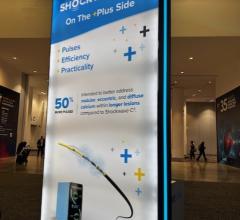
October 23, 2015 — A randomized trial found that ranolazine did not reduce the composite rate of ischemia-driven revascularization or hospitalization in patients with a history of chronic angina who had residual unrevascularized coronary artery disease after percutaneous coronary intervention (PCI).
Findings from the RIVER-PCI trial were reported at the 27th annual Transcatheter Cardiovascular Therapeutics (TCT) scientific symposium, sponsored by the Cardiovascular Research Foundation (CRF), and published in The Lancet.
Incomplete revascularization (ICR) after PCI is associated with increased mortality and adverse cardiovascular events. Whether intensive anti-anginal medical therapy can reduce the rates of adverse events among patients with ICR is unknown. Ranolazine, a piperazine derivative, is a late sodium current blocker that reduces intracellular calcium overload during ischemia, and is indicated for the treatment of angina.
RIVER-PCI was a multicenter, randomized, parallel-group, double-blind, placebo-controlled, event-driven trial conducted at 245 centers in 15 countries. In the study, 2,604 qualifying patients with a history of chronic angina and ICR (residual unrevascularized coronary artery disease) were randomized to ranolazine (n=1,317) or placebo (n=1,287). The primary efficacy endpoint was the time from randomization to the first occurrence of ischemia-driven revascularization or ischemia-driven hospitalization without revascularization.
Incomplete revascularization was associated with high event rates. After a median follow-up of 643 days, the composite primary endpoint occurred in 345 patients assigned to ranolazine and 364 assigned to placebo (Kaplan-Meier estimates 26.2 percent vs. 28.3 percent respectively; HR 0.95; 95 percent CI 0.82 to 1.10; p=0.48). The results were consistent across multiple subgroups. There were no significant differences between the two groups in the incidence of the components of the primary endpoint or major secondary endpoints including sudden cardiac death, cardiovascular death and myocardial infarction.
“The results of RIVER-PCI show that the routine use of ranolazine does not reduce the composite rate of ischemia-driven revascularization or hospitalization in patients with a history of chronic angina who had ICR after PCI,” said lead investigator Giora Weisz, M.D. Weisz is chairman of cardiology at Shaare Zedek Medical Center in Jerusalem, Israel. He is also an associate professor of medicine at Columbia University Medical Center in New York.
“RIVER-PCI is the first trial to have prospectively studied patients with incomplete revascularization after PCI, and to examine the potential role of adjunctive anti-ischemic pharmacotherapy,” he said.
The RIVER-PCI trial was sponsored and funded by Gilead Sciences Inc. and The Menarini Group. Weisz reported being a member of the medical advisory boards of AngioSlide, AstraZeneca, Calore, Corindus, Medtronic, Medivisor and M.I. Medical Incentives. He also reported institutional research grants from AngioSlide and Corindus.
Study investigators Ori Ben-Yehuda, M.D., and Philippe Généreux, M.D., are employees of CRF, which received a grant from Gilead Sciences Inc. for study management.
For more information: www.tctconference.com


 October 31, 2025
October 31, 2025 









